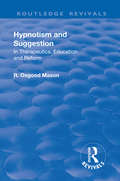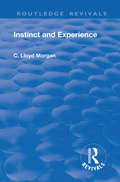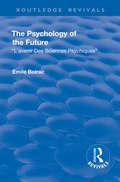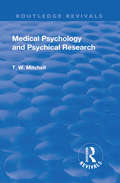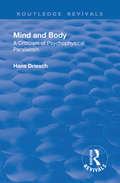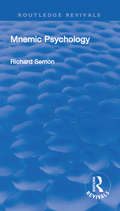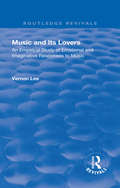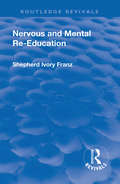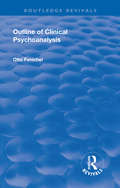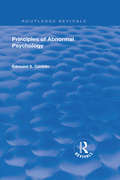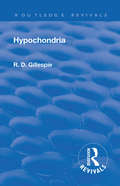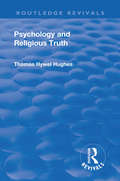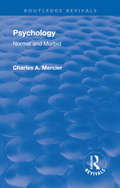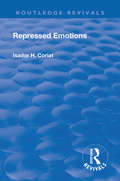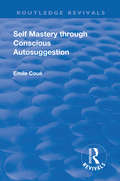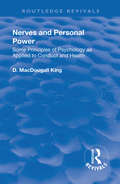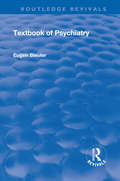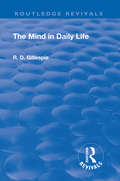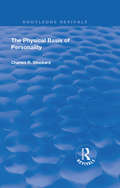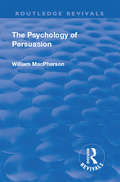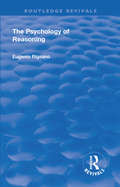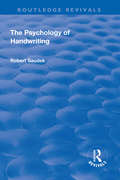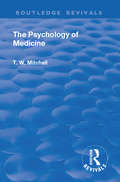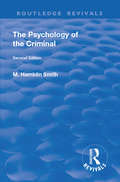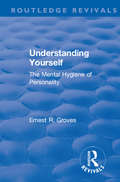- Table View
- List View
Revival: In Therapeutics, Education and Reform (Routledge Revivals)
by R. Osgood MasonThe volume here presented does not assume to be a systematic treatise upon hypnotism, nor even upon its therapeutic uses; for that the works of Bernheim, Moll, Wetterstrand, Tuckey and others may suffice – but there are certain phases of hypnotism which seem to the author to be of special interest and present importance, and it is for the purpose of distinctly presenting these special phases that the following chapters have been prepared.
Revival: Instinct and Experience (Routledge Revivals)
by C. Lloyd MorganIn the summer of 1910 a symposium on the subject of Instinct and Intelligence was held in London at a joint meeting of the Aristotelian and British Psychological Societies and of the Mind association. Considerable interest in the discussion was shown both in the room in which we met and beyond its walls. The papers then taken as read, and subsequently published in the "British Journal of Psychology," disclose not a little divergence in the sense in which the terms instinctive and intelligent are used, an underlying divergence in the principles on which the proffered interpretations are based, and indications, more or less clear, of yet deeper-seated differences of philosophical foundation.
Revival: L'Avenir des Sciences Psychiques (Routledge Revivals)
by Émile BoiracMaterial contained in this book constitute an entirely new departure in the field of psychological study and experimentation.
Revival: Medical Psychology and Psychical Research (Routledge Revivals)
by Thomas Walker MitchellThis book deals with those branches of Medical Psychology which have thrown most light on the problems of Psychical Research, namely, Hypnotism, Hysteria, and Multiple Personality. The greater part of the contents had already been published in the forms of papers contributed to the Proceedings of the Society for Psychical Research between 1910 and 1922 when the book was first released.
Revival: Mind and Body: A Criticism of Psychophysical Parallelism (Routledge Revivals)
by Hans DrieschThis little book is not a text-book of psychology. It is exclusively concerned with one particular psychological problem, a problem, however, that stands at the very centre of psychology. The relations between mind and body are analysed; that is to say, the following three psychedelic problems are successively raised: What is the mind? What is the body? What are the relations between mind and body? But it is only the third problem which is extensively dealt with; the first two are only briefly defined.
Revival: Mnemic Psychology (Routledge Revivals)
by Vernon Lee Richard Wolfgang Semon Bella DuffyIt is the reproduction of the old book published long back (1923)
Revival: Music and Its Lovers (Routledge Revivals)
by Vernon LeeAn empirical study of imaginative responses to music.
Revival: Nervous and Mental Re-Education (Routledge Revivals)
by Shepherd Ivory FranzThe problems of readjustment, for the individual and for the business purse and for the state, which inevitably follow war are most important at the present moment. Almost five years after the end of the Great Conflict, many of these problems are still facing us, and it will take many more years before they are settled. One who is interested in the statistics of conditions will find many places in which they can be found. Although statistics show what exists or has existed, they seldom provide advice regarding the solutions. The present work is entirely lacking in statistics It is intended to be of assistance in the solution of some problems.
Revival: Outline of Clinical Psychoanalysis (Routledge Revivals)
by Otto FenichelA comprehensive presentation of the dynamics of neurosis, with valuable clinical material and a discussion of treatment; translated from the German. The wealth of clinical and theoretical data which psychoanalysis has been gathering for almost forty years as yet awaits an adequate systematization. A number of summaries and more or less complete systematic reviews of the field of psychoanalysis have been attempted and a number of them, of greater or less value, have been published with either the specialist or the general medical or or lay public in mind. Dr. Fenichel’s Outline is not one of these attempts. It is rather a systematized and almost impersonal presentation of clinical data which psychoanalysis has collected in the course of almost forty years and Dr. Fenichel frankly sacrifices simplified clarity to systematic completeness. The clinician will find it a very useful reference book; the general medical reader or the psychologist will find it to be a plain statement of fact made without prejudice or special preference to any of the variety of currents in present day psychoanalytical thought. It is the first outline of what the psychoanalytical trends are in the field of clinical work, leaving out the controversial attitudes which are always to be found in a living scientific discipline that has not yet become dogmatized.
Revival: Principles of Abnormal Psychology (Routledge Revivals)
by Edmund Smith ConklinThe literature since the first edition has been reviewed and material from it has been inserted, with particular emphasis on experimental contributions. Major additions are made in the sections on speech abnormalities, constitutional psychopathic inferiority, behavior effects of epidemic encephalitis, and psychotherapy. The chapters on psychoneuroses now precede those on the psychoses. The revised work consists of 21 chapters and an index; bibliographies are presented in footnotes and at the ends of chapters.
Revival: Psyche Miniatures - Medical Series No 12 (Routledge Revivals)
by E. D. GillespieHypochondria
Revival: Psychology And Religious Truth (1942) (Routledge Revivals)
by Thomas Hywel HughesAn attempt is made in this book to open a new line of thought in theology with the aid of Psychology. The author strives to throw light on the basic truths of religion from a new angle and to adopt a different attitude to that usually taken by theologians. He believes that there is still more light which psychology can throw regarding these truths, but its findings are not yet adequate nor sufficiently clear for this. Here the lectures cover the bearing of psychology on - The Origin of Religion; The Idea of God: Religious Life; Religious Truth and Belief; The Trinity; The Person of Christ; The Atonement; and The Future Life.
Revival: Psychology: Normal and Morbid (Routledge Revivals)
by Charles Arthur MercierInsanity is no exception to the rule which requires a knowledge of the normal as an indispensable preliminary to a knowledge of the abnormal. This book, published in 1901, aimed to provide the first systematic examination of the disorders of the mind as arranged and correlated with the normal types from which they arringly depart.
Revival: Repressed Emotions (Routledge Revivals)
by Isador H. CoriatPsychology in both its academic and practical aspects is now at the parting of the ways and the immediate future will determine whether it shall remain unproductive or become an instrument of practical importance in the guidance of human interests
Revival: Self Mastery Through Conscious Autosuggestion (Routledge Revivals)
by Emile CoueSuggestion, or rather Autosuggestion, is quite a new subject, and yet at the same time it is as old as the world. It is new in the sense that until now it has been wrongly studied and in consequence wrongly understood; it is old because it dates from the appearance of man on the Earth. In fact, autosuggestion is an instrument that we possess at birth and in this instrument, or rather in this force, resides a marvellous and incalculable power, which according to circumstances produces the best or the worst results. Knowledge of this force is useful to each one of us, but it is peculiarly indispensable to doctors, magistrates, lawyers, and to those engaged in the work of education. By knowing how to practice it consciously it is possible in the first place to avoid provoking in others bad auto-suggestions which may have disastrous consequences, and secondly, consciously to provoke good ones instead, thus bringing physical health to the sick, and moral health to the neurotic and the erring, the unconscious victims of anterior autosuggestions, and to guide into the right path those who had a tendency to take the wrong one.
Revival: Some Principles of Psychology as Applied to Conduct and Personal Power (Routledge Revivals)
by D. MacDougall KingThe aim of this treatise is to give the public a much needed understanding of those factors in everyday living which on the one hand tend toward nervous weakness, and on the other make for personal power. From the author’s viewpoint, everybody at times suffers from symptoms which are popularly termed "nervous," for nervousness is a matter of degree rather than kind. Whether "nerves" take the form of unreasonable impulsiveness or of serious obsessions occasioning body pain, the fundamental cause and radical cure of both are essentially the same.
Revival: Textbook of Psychiatry (Routledge Revivals)
by Eugen BleulerThis book marked a notable advance in psychiatry in that it emphasizes sharply the contrast between the older descriptive psychiatry of Kraeplin and the newer interpretative psychiatry of the present time which utilizes the psychoanalytical principles and general biological viewpoints developed by Freud and his pupils in Europe and by Meyer, Hoch, White and others. As an introduction to the study of clinical psychiatry the physician and the student will find the chapters dealing with the principles of psychology and psychopathalogy particularly helpful and stimulating.
Revival: The Mind In Daily Life (1933) (Routledge Revivals)
by R. D. GillespieThis book is an elementary exposition. It contains no more technically than seemed readily understandable by the intelligent layman and the medical student desiring a merely general introduction to modern views on the motives of human conduct and the mental processes of which that conduct is the expression. Part I gives some account of processes and motives that are universal and therefore normal. Part II is written from the angle of the physician who sees the results, always common but nowadays more frequently discussed, of the miscarriage of the normal development of human beings as such.
Revival: The Physical Basis Of Personality (1931) (Routledge Revivals)
by Charles Rupert StockardAn outcome of the 1930 series of Lane Medical Lectures at Stanford University. To develop the completed personality a long series of interactions between the original basis and the surrounding environment is essential. A discussion of the effects on developing personalities of uniting entire individuals and of transplanting organs and parts leads to a convincing demonstration of the "high improbability of the inheritance of acquired characters." From the chapter on exaggerated deviations from racial types, in which the author treats of dwarfs and giants, we are led into a section on deviations in structural types among various breeds of dogs. The closing chapters treat mainly of the two normal adult types, the dolichocephalic (linear, long-headed) and the brachycephalic (lateral, short-headed), their characteristics, geographic distribution and age modifications. A brief section is devoted to the sex glands, senility and rejuvenation, the author demonstrating that the sex gland rejuvenation idea is based upon an entirely erroneous conception. Man's deviation from his nearest animal relatives, namely, intellectual achievement, has probably been initiated by two evolutionary changes: (1) some mutation which has resulted in the retention of head proportions comparable to those found in the fetal stages of the higher mammals: this gives a disproportionately large cranium and big brain with small facial region as compared to the reverse adult proportions among other mammals; (2) a germinal mutation resulting in an exaggerated prolongation of childhood and the stages of immaturity to more than twenty years, thus extending enormously the learning period of man. There are considerable experimental material, over seventy figures, and a bibliography of 260 titles.
Revival: The Psychology Of Persuasion (1920) (Routledge Revivals)
by William MacPhersonIn the first three chapters of this book the elements of persuasion as a mental process are distinguished, and various forms of false persuasion in individuals and groups are described; it is shown how, from the very nature of the process involved, our persuasion of ourselves is only too apt to degenerate into self-deception, and how our persuasion of others may eaily assume the form of a deliberate attempt to exploit their mental or moral weaknesses. Chapter IV indicates how the tendencies of false persuasion may be counteracted, and on what lines persuasion may be rightly directed. Up to this point the subject is treated mainly in its psychological aspect. The subsequent chapters, which are closely related to, and follow naturally, the study of persuasion as a mental process, deal with persuasion more exclusively as a form of expression. In this part of the book special attention is given to such modern forms of propaganda as advertisements, newspapers, the cinematograph, the novel and the drama.
Revival: The Psychology Of Reasoning (1923) (Routledge Revivals)
by Eugenio RignanoThis Book owes its origin to the indefinable sense of uneasiness and discontent into which I was thrown by the perusal of some of the best treatises on Logic. These treatises had failed to explain the nature of the logical or reasoning faculty, though purporting to indicate the laws which govern its proper functioning. Even the work of John Stuart Mill, which still remains in my opinion the best, was no more convincing than the rest. And the more I read of such books the less satisfied I became and the stonger became my desire to understand clearly what constituted reasoning. As for the psychologists I found to my surprise that they either omitted reasoning altogether, or alluded to it in a most superficial manner.
Revival: The Psychology of Handwriting (Routledge Revivals)
by Robert SaudekGraphology, in English and American manuals of handwriting, stands in the relation with all other pseudo-sciences, founded on half truths and wrought with superstition and amateur fads, compared to modern science. In this book, the author attempts to put before the English public the fundamental principles, methods and laws of scientific graphology. Contents: common objections to graphology and their refutation; history of graphology; physiology and psychology of writing; random test of the correctness of methods explained; practical hints for drawing up of graphological analyses; specimens of analysis.
Revival: The Psychology of Medicine (Routledge Revivals)
by Thomas Walker MitchellThis book is intended primarily for those readers who have had no professional training in either Medicine or Psychology, but who are anxious to keep themselves abreast of modern thought in these departments of knowledge. At the same time I hope it may prove serviceable to professional students of these subjects as a preliminary survey of the ground they will have to cover should they desire to specialize in psychotherapies or in the psychology of the abnormal. The topics discussed have been dealt with only in outline. My endeavour has been to state the general principles on which modern conceptions in the Psychology of Medicine are based and to avoid as far as possible all detail which is unncessary for comprehension of these principles.
Revival: The Psychology of the Criminal (Routledge Revivals)
by Maurice Hamblin SmithThis book is based upon twenty-three years experience in local and convict prisons, and more particularly upon the work done, during the past three years, with offenders from Courts in Birmingham and the adjacent districts. The main object is to demonstrate how important is the throrough examination of the individual offender, especially in regard to his mentality. It is only by a great extension of this line of investigation that we can hope to solve the problems which criminality presents. A considerable part of the book is devoted to that new development of psychology which is known as psycho-analysis, and to the possible applications thereof to the investigation and treatment of offenders. The book includes a brief description of the theory and technique of psycho-analysis, so that the reader may not have to look elsewhere for an explanation of technical terms.
Revival: Understanding Yourself: The Mental Hygiene Of Personality (1935) (Routledge Revivals)
by Ernest R. GrovesThis book has a practical purpose. It seeks to help the reader to understand himself and his problems, that he may increase his successes, his fruit, and his satisfactions. The discussion centers about the conditions that shape personality, but the attempt of the book is not to rehearse the findings and theories of science but to provide the means by which the reader can come to a better understanding of himself.
